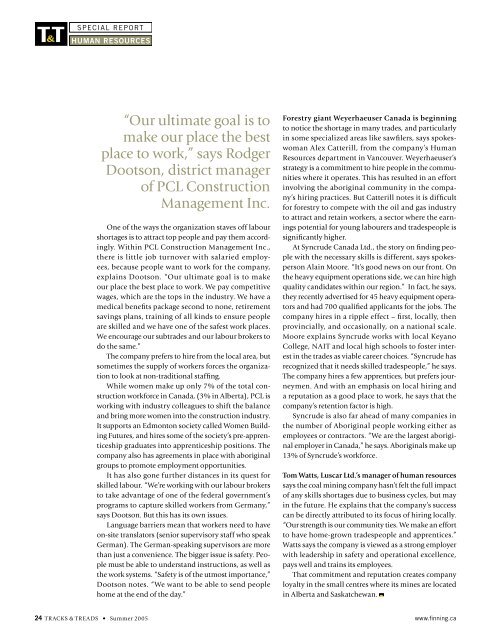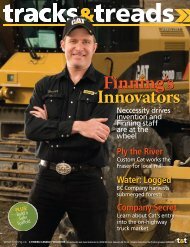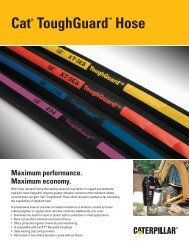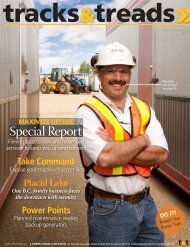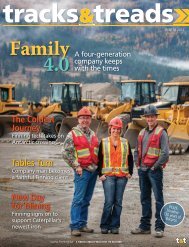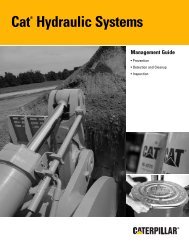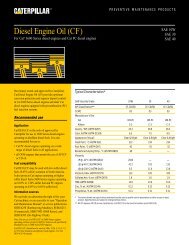Caterpillar - Finning Canada
Caterpillar - Finning Canada
Caterpillar - Finning Canada
Create successful ePaper yourself
Turn your PDF publications into a flip-book with our unique Google optimized e-Paper software.
SPECIAL REPORTHUMAN RESOURCESSPECIAL REPORTHUMAN RESOURCES“Our ultimate goal is tomake our place the bestplace to work,” says RodgerDootson, district managerof PCL ConstructionManagement Inc.INDUSTRY REPORTLANDSCAPINGOne of the ways the organization staves off labourshortages is to attract top people and pay them accordingly.Within PCL Construction Management Inc.,there is little job turnover with salaried employees,because people want to work for the company,explains Dootson. “Our ultimate goal is to makeour place the best place to work. We pay competitivewages, which are the tops in the industry. We have amedical benefits package second to none, retirementsavings plans, training of all kinds to ensure peopleare skilled and we have one of the safest work places.We encourage our subtrades and our labour brokers todo the same.”The company prefers to hire from the local area, butsometimes the supply of workers forces the organizationto look at non-traditional staffing.While women make up only 7% of the total constructionworkforce in <strong>Canada</strong>, (3% in Alberta), PCL isworking with industry colleagues to shift the balanceand bring more women into the construction industry.It supports an Edmonton society called Women BuildingFutures, and hires some of the society’s pre-apprenticeshipgraduates into apprenticeship positions. Thecompany also has agreements in place with aboriginalgroups to promote employment opportunities.It has also gone further distances in its quest forskilled labour. “We’re working with our labour brokersto take advantage of one of the federal government’sprograms to capture skilled workers from Germany,”says Dootson. But this has its own issues.Language barriers mean that workers need to haveon-site translators (senior supervisory staff who speakGerman). The German-speaking supervisors are morethan just a convenience. The bigger issue is safety. Peoplemust be able to understand instructions, as well asthe work systems. “Safety is of the utmost importance,”Dootson notes. “We want to be able to send peoplehome at the end of the day.”Forestry giant Weyerhaeuser <strong>Canada</strong> is beginningto notice the shortage in many trades, and particularlyin some specialized areas like sawfilers, says spokeswomanAlex Catterill, from the company’s HumanResources department in Vancouver. Weyerhaeuser’sstrategy is a commitment to hire people in the communitieswhere it operates. This has resulted in an effortinvolving the aboriginal community in the company’shiring practices. But Catterill notes it is difficultfor forestry to compete with the oil and gas industryto attract and retain workers, a sector where the earningspotential for young labourers and tradespeople issignificantly higher.At Syncrude <strong>Canada</strong> Ltd., the story on finding peoplewith the necessary skills is different, says spokespersonAlain Moore. “It’s good news on our front. Onthe heavy equipment operations side, we can hire highquality candidates within our region.” In fact, he says,they recently advertised for 45 heavy equipment operatorsand had 700 qualified applicants for the jobs. Thecompany hires in a ripple effect – first, locally, thenprovincially, and occasionally, on a national scale.Moore explains Syncrude works with local KeyanoCollege, NAIT and local high schools to foster interestin the trades as viable career choices. “Syncrude hasrecognized that it needs skilled tradespeople,” he says.The company hires a few apprentices, but prefers journeymen.And with an emphasis on local hiring anda reputation as a good place to work, he says that thecompany’s retention factor is high.Syncrude is also far ahead of many companies inthe number of Aboriginal people working either asemployees or contractors. “We are the largest aboriginalemployer in <strong>Canada</strong>,” he says. Aboriginals make up13% of Syncrude’s workforce.Tom Watts, Luscar Ltd.’s manager of human resourcessays the coal mining company hasn’t felt the full impactof any skills shortages due to business cycles, but mayin the future. He explains that the company’s successcan be directly attributed to its focus of hiring locally.“Our strength is our community ties. We make an effortto have home-grown tradespeople and apprentices.”Watts says the company is viewed as a strong employerwith leadership in safety and operational excellence,pays well and trains its employees.That commitment and reputation creates companyloyalty in the small centres where its mines are locatedin Alberta and Saskatchewan.24 TRACKS & TREADS • Summer 2005 www.finning.ca


